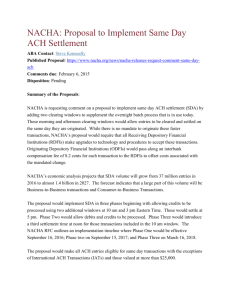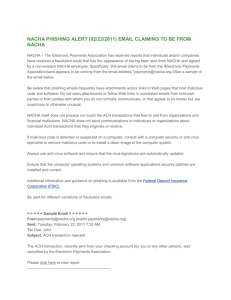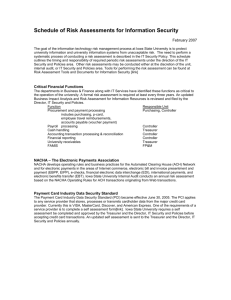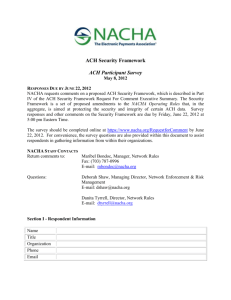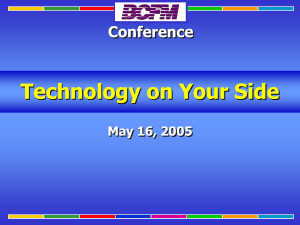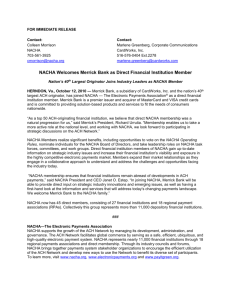2014-05-16 payCLT – NACHA Rule Update
advertisement
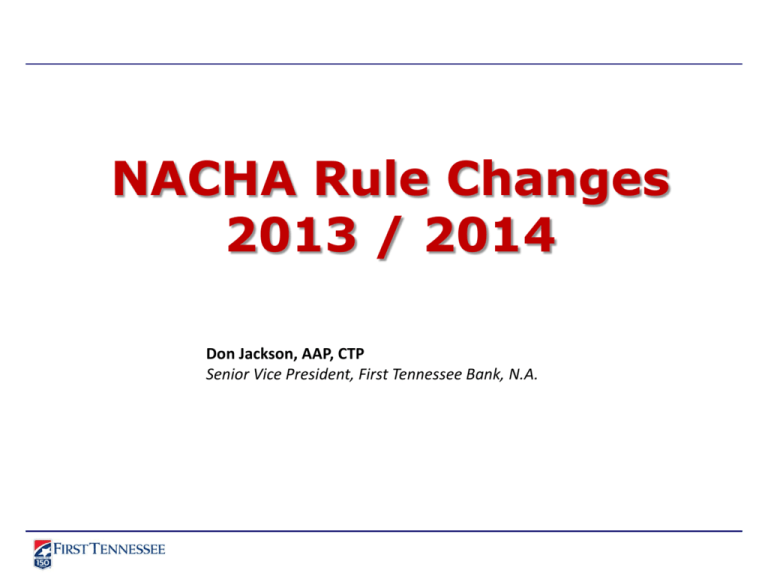
NACHA Rule Changes 2013 / 2014 Don Jackson, AAP, CTP Senior Vice President, First Tennessee Bank, N.A. NACHA Rule Changes – 2013 / 2014 DISCUSSION TOPICS NACHA Rule Making Process ACH Security Framework Heathcare Payments P2P Transactions Same Day ACH – Market Survey Expanded Addenda Records - RFI 2 NACHA Rule Making Process Current Structure of the Rulemaking Process became effective January 1, 2012 • Guiding principles • Hierarchy, roles and composition of groups • Participation policies • Process flow and annual timeline • Benefits and considerations Interpretative Rules Process Pilot and Opt-in Program Approval Processes 3 Guiding Principles for the Rulemaking Process Efficient, effective use of members’ and volunteers’ time and resources Consensus reached in order to achieve voting thresholds • • • Inclusive of members and other stakeholders Open to participation Solicit and respond to feedback Federal Reserve and Treasury incorporation of NACHA rules is predicated on an open process 4 NACHA Rule Making Process - Balance Inclusive Responsive Thorough 5 NACHA Rule Making Process - Hierarchy Rules & Operations Committee Operator Technical Issues Product Innovation Software Information Exchange Risk & Quality Compliance & Operations 6 NACHA Rule Making Process – SRG Roles Rules and Operations Committee (R&O) • Provide strategic oversight to the Rulemaking Process • Assess potential new applications and services • Monitor the progress of issues through the Process and make decisions on next steps for an initiative based on recommendations from the Work Group • Review Requests For Information and Requests For Comment • Approve membership of Standing Rules Groups and provide oversight to these groups • Review and approve pilot and opt-in program proposals • Review and approve distributing ballots to the NACHA Voting Membership • Responsible for reporting to the Board. Operator Technical Issues (OTI) • Provide input focused on potential ACH Operator impacts and time needed for development. • Review all proposals prior to RFC and prior to ballot. Software Information Exchange (SIX) • Provide input focused on ACH processing software impacts to the participants in the Network, including the amount of modifications needed and time needed to implement a change. • Review all proposals prior to RFC. 7 NACHA Rule Making Process - SRG Roles Product Innovation Risk & Quality • Focus on new ways to use the Network or substantial enhancements • Subgroups "Industry Work Groups" could be formed for specific topics • No limit to number of RFCs/ballots per year • Focus on Rules related to risk and quality in the ACH Network • 2 RFC/ballot periods per year (May & November) Compliance & Operations • Focus on Rules related to operations, maintenance, and compliance with other regulations • 2 RFC/ballot periods per year (February & August) 8 NACHA Rule Making Process Flow Idea submission •Rules Committee reviews Submission and determines SRG placement •Standing Rules Group develops proposal •Input from Operator Technology & Software Information Exchange update provided to Voters •Rules Committee approves distributing RFC to industry RFC •After RFC comment period, Group reviews responses, makes revisions to proposal •Review by Operator Technology & Voters •Rules Committee approves distributing ballot to Voters Ballot •Voters have 15 banking days to cast vote •Proposed rule amendment must be approved by 2/3rds of the votes cast or by 3/4ths of members Implementation 9 NACHA Rule Making Process First Quarter • February – RFC/Ballot period for Compliance & Operations SRG • March – Rules implementation date (software changes) Second Quarter • May – RFC/Ballot period for Risk & Quality SRG • June – Rules implementation date Third Quarter • August RFC/Ballot period for Compliance & Operations SRG • September– Rules implementation date (software changes) Fourth Quarter • November– RFC/Ballot period for Risk & Quality SRG Product Innovation may release RFCs/Ballots as needed Rules with no software impacts may implement as needed December implementation date available but rarely used 10 NACHA Rule Making Process - Pilots Purpose: Allows NACHA to test an application and impacts on FIs (their clients and customers) to determine whether to move into rulemaking - generally involves determining whether to adopt a new SEC Code Baseline Assumption: There is a need for a new SEC Code or changes to the Rules that would require industry-wide participation, and that a pilot would be needed to test technological, operational and customer service impacts before going into rulemaking Term: Defined start and end dates Business Case: Industry level preliminary business case needed to justify pilot Pilot to demonstrate benefits and impacts Full business case needed to move into rulemaking (typically for a new SEC Code) 11 NACHA Rule Making Process – Opt In Programs Purpose: Allows FIs to utilize the ACH Network, under the auspices of NACHA, where there may not be a need by all FIs on the Network, and where there is no immediate need for a broad-based Rule. Baseline Assumption: Not all FIs may need functionality, so there is no need for a new SEC Code or broad-based changes to the Rules. This utilization will bring new volume onto the Network or prevent volume from moving off the Network, while still being governed under the auspices of NACHA Term: No defined end dates Business Case: No direct impact beyond opt-in group of FIs participating and their customers Each FI develops its own business case - no industry-wide assessment required Limited NACHA resources to support if outside annual Plan of Work 12 NACHA Rule Making Process – Opt In Programs Rules proposals are categorized as: (A) Major impact to Network (Category A), (B) Moderate impact to Network (Category B), or (C) Minor impact to Network (Category C). 13 NACHA Rule Changes 2013 / 2014 DISCUSSION TOPICS ACH Security Framework Heathcare Payments P2P Transactions Same Day ACH – Market Survey Expanded Addenda Records - RFI 14 NACHA Rule Changes 2013 ACH Security Framework This amendment is aimed at protecting the security and integrity of ACH data throughout it’s lifetime. Participants are required to establish, implement and update Security Policies, Procedures and systems to initiate, process or store ACH entries ODFIs are required to establish the identity of Originators and Third Parties using the ACH Network All DFIs, Third Party Service Providers and Third Party Senders are required to conduct and annual audit of compliance with this amendment. 15 NACHA Rule Changes 2013 Healthcare Payment via ACH The Patient Protection and Affordability Care Act (AKA Obama care) requires standards for healthcare electronic funds transfers. Use if the CCD+ NACHA standard entry class with addenda has been adopted as the standard Use of the EDI TRN segment has been adopted to contain the “reassociation number” Providers must contact their FIs to receive CCD Batch Header to contain HCCLAIMPMT to identify the entry as a health care transaction CCD Batch Header to contain a Company Name that is easily recognizable by the receiver 16 NACHA Rule Changes 2014 P2P Payments via ACH Standardize the use of the ACH Network for person-to-person payments Previously, the WEB Standard Entry Class only allowed debit entries WEB Standard Entry Class for credit entries is restricted to P2P Unlike other origination activity, an Originator of a P2P entry is not required to have an origination agreement with the ODFI The Sender of the credit entry is identified within the Individual ID field and the P2P Service Provider is identified in the Company Name field of the Batch Header record 17 Same Day ACH Market Survey Potential Rule “Strawman” ODFIs to submit files by 10:00 a.m. ET and 3:00 p.m. ET, available to RDFIs by 11:00 a.m. ET and 4:00 p.m. ET Phase I – ACH Credits only, limited to $25,000 or less, proposed effective date of September 2016, Settlement at 5:00 p.m. ET Phase II – ACH Credits and Debits, limited to $25,000 or less, proposed effective date of September 2017, Settlement at 5:00 p.m. ET Phase III – ACH Credits and Debits, limited to $25,000 or less, proposed effective date of March 2018, Settlement at noon ET and 5:00 p.m. ET Survey gathers data from RDFIs regarding the incremental expenses incurred under the above Strawman. Staff, potential risk, and to bank’s P&L. 18 Expanded Addenda Records Request for Information Payments plus Information - Expansion of Addenda Records All Standard Entry Classes with the exception of CTX are limited to one addenda record with 80 characters of available space for additional information. The RFI considers increasing the number of records for 1 to 9 and possibly removing the restriction 9,999 records on CTX. Modifications are also considered that would include a type code to indicate if the addenda contains free text, URL, HML, etc. 19 QUESTIONS? 20
